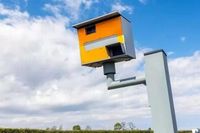A call for action against the use of "ghost" number plates has gained momentum, with West Bromwich MP Sarah Coombes leading the charge for stringent penalties against drivers using misleading vehicle registration plates. The Labour MP recently addressed Parliament, advocating for £1,000 fines and six penalty points for those who evade the law through these unauthorized registration plates.
Coombes highlighted the growing prevalence of ghost plates, which are often associated with the evasion of traffic laws, stating, "The drivers using these ghost plates have gone under the radar for too long, but now they've been rumbled and it's time to crack down on them." These plates have reportedly allowed reckless individuals to escape accountability for offenses such as running red lights and speeding, often causing dangers for other road users.
One of the main concerns raised by Coombes was the accessibility of ghost plates, which can reportedly be purchased for as little as £30 on various online platforms. This accessibility, she argues, has contributed to the rising cases of dangerous driving linked to these plates. Coombes emphasized the urgent need for legislation, saying, "It cannot be right ... creating so much danger for everyone else."
While the MP's proposed measures are largely welcomed, they have sparked debate about the technicalities of what constitutes ghost plates. Mark Trimbee, CEO of Regtransfers, cautioned against the potential confusion created by the differing definitions of ghost plates, which some describe as having 3D or 4D lettering. He noted, "It took a simple search on Google to find several instances where the term 'ghost plates' was being applied to both 3D and 4D plates - which is likely to cause undue confusion."
This ambiguity may complicate the enforcement of any new regulations. Coombes's initiative, presented as part of the Ten Minute Rule Bill in Parliament, aims to establish clearer guidelines and penalties to combat this issue.
Andrew Jervis, Co-Founder and CEO of ClickMechanic, also chimed in on the discussion by proposing enhancements to the MOT testing process as part of tackling the issue of ghost plates. He suggests using diagnostics tools to read vehicles' on-board diagnostics, which could include recording fault codes as evidence during tests. He stated, "A photo proves the car was there, it doesn’t prove the test was conducted properly."
Jervis emphasized the importance of addressing the core of illegal activities surrounding MOT tests, advocating for stricter enforcement against businesses offering fraudulent services. He explained, "To really clamp down on this, the DVSA and enforcement teams need to target and crack down on places offering these fake MOTs through fines and removing their licenses."
This multifaceted approach to tackling ghost plates aims to not only penalize offenders but also tighten the loopholes exploited within vehicle registration and MOT testing processes. The proposed crackdown follows rising concerns over road safety linked to the use of ghost plates, as fictitious registrations have been associated with numerous reckless driving incidents.
The debate surrounding ghost plates introduces significant questions about the responsibility of car owners and the role of regulators to uphold safety. Coombes has taken the lead by bringing this discussion to the floor of Parliament, and her proposed measures could soon initiate transformative changes to the way the UK handles vehicle registration compliance.
With public safety at the forefront, the urgent steps toward enforcing penalties and clarifying the definition of ghost plates are seen as imperative by both lawmakers and road safety advocates. The outcome of this initiative could set important precedents for future legislation related to vehicle regulations, creating stronger accountability frameworks for all drivers across the UK.



